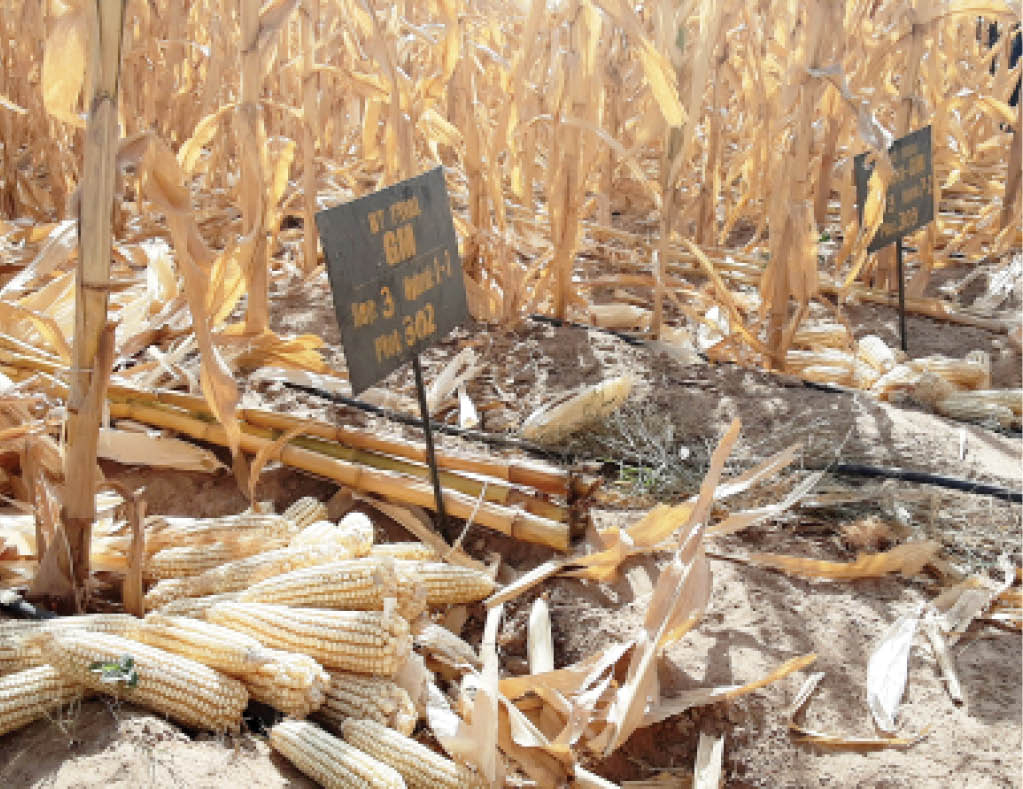Tela Maize harvest shows potential for 8 tons per hectare
Last Tuesday, the Institute for Agricultural Research (IAR), Ahmadu Bello University Zaria, invited relevant stakeholders, including journalists, to witness third harvest of the Tela Maize variety Confined Field Trials (CFT) under its Tela Maize Research Project funded by the Africa Agricultural Technology Foundation (AATF). The maize variety derived its name “TELA” from the Latin word […]

Harvest ongoing in the farm
Last Tuesday, the Institute for Agricultural Research (IAR), Ahmadu Bello University Zaria, invited relevant stakeholders, including journalists, to witness third harvest of the Tela Maize variety Confined Field Trials (CFT) under its Tela Maize Research Project funded by the Africa Agricultural Technology Foundation (AATF).
The maize variety derived its name “TELA” from the Latin word “TUTELA” which means ‘protection’. The maize variety is bred with protection against insect pests and draught.
- Why farmers seek Anchor Borrowers expansion
- Katsina potato farmers devise storage method as production increases
The Principal Investigator, Professor Rabiu Adamu and other scientists who conducted journalists round the harvest, said the idea of the research work was to produce maize varieties that are resistance or that are highly protected against two major insect pests: stalk (stem) borers and Fall Army Worm and additional protection against moderate draught.
“This is all about producing crops that are high yielding under stressed conditions; the stresses are Fall Army Warm and stem borers, which are major constraints to maize production. If not controlled, it could cause up to 80 percent yield lost; and draught – if you don’t manage moisture (rain) deficit very well, you may not get any yield.
“We have done this trial for the third time. We did the first trial under the dry season in March, and during the rainy season, we conducted another one from June to November. This is the third trial from November to April. The trial is composed of three major trials: the transgenic or biotechnology hybrids or materials that were resistance to stalk (stem) borers and Fall Army Worm.
“The second trail is about those materials we’re evaluating that would do well in the presence of draught while the last one is under optimum – that is, even if you have draught and insect pests, if you try to manage them, how would the yield of those maize varieties and hybrid you’re trying to produce look like. So, in essence, this is what we are trying to showcase,” the Principal researcher said.
With the three CFT trials successful, researchers will have to test and validate them from the farmers’ field to show that what they recorded from their own research station equally performs well in the farmers’ fields on wide range of locations over wide ecological conditions, beginning from 2021 rainy season.
By the end of 2022, if all things work fine, Nigerian farmers would expect these hybrids to be with them.
Dr. Muhyideen Ayekunle, a maize breeder under the project, said from the last two trials conducted, the transgenic variety recorded yield advantage of 17 percent over non- BT despite heavy infestation. The varieties under trials were infested three times unlike the previous ones to virtually look at the efficacy of the BT gene in the maize product. With the outcome, researchers said the yield will definitely increase above 17 per cent.
“So after, we’re going to analyze the data and then prepare a document to get approval for environmental release. We’re going to submit the dossiers to the National Biosafety Management Agency (NBMA) and it will be reviewed. Once we get approval that these products, we can come out of the confinement and then we can have a national performing trial.
The Director General/CEO of the National Biotechnology Development Agency (NBDA), Professor Abdullahi Mustapha, at the event, called on the scientists to continue to search for ‘abiotic and biotic’ solutions to the challenges facing farmers in the country.
“We have tested technologies capable of providing solutions to problems that farmers face, let us take advantage of it and move forward,” he said.
Dr Rose Maxwell Gidado, the Country Coordinator OFAB Nigeria, said the impact was actually going to be much. “Farmers are going to have yield increase of 17 percent and you know that farming is all about productivity and harvestable yield. Once you have yield, of cause you’re going to have bumper harvest and profit.”
She said by the time these maize varieties are ready to get to the farmers, it will increase their livelihood, money and then the price of maize would come down.
The Tela Maize project is a public-private partnership that is working towards initiating commercialization of transgenic draught-tolerant and insect-protected maize varieties to enhance food security in seven Sub-Saharan African countries: South Africa, Nigeria, Kenya, Ethiopia, Uganda, Mozambique and Tanzania.
